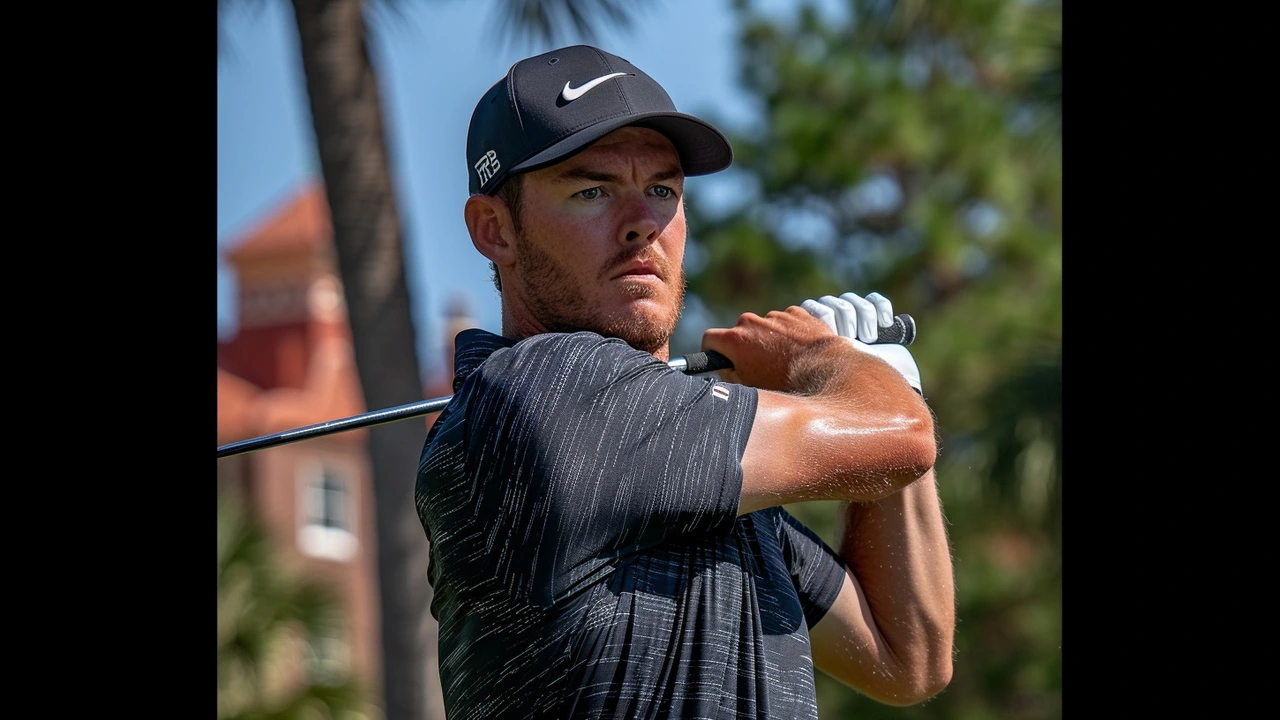Golf Community Mourns the Loss of Grayson Murray
The golf world was rocked by the tragic news of PGA Tour golfer Grayson Murray's passing at the tender age of 30. Murray, who had recently withdrawn from the Charles Schwab Challenge in Fort Worth, Texas, due to an unspecified illness, was a bright star on the golf scene. Although the cause of his death has not yet been disclosed, the impact on the community has been profound and immediate.
A two-time PGA Tour winner, Murray recently clinched victory at the Sony Open in a dramatic playoff, ending a prolonged winless streak that spanned over six years. His career, while paved with successes, was equally marked by struggles with mental health and various physical issues. He was candid about his battles with alcohol and anxiety, seeking treatment and raising awareness along the way. His openness about these struggles resonated deeply with fans and fellow players alike.
Murray's Early Promise
Grayson Murray was not just a name in the golfing community; his talents were evident from a young age. He captured three prestigious IMG Junior World titles and became the second youngest to make the cut on the Korn Ferry Tour at just 16 years old. His initial promise was fulfilled when he went on to play in the 2013 U.S. Open and later claimed victory at the 2017 Barbasol Championship at age 23. Murray's skill set him apart, showcasing both his potential and determination.
Murray's early years in golf, filled with accolades and achievements, painted a picture of what the future might hold. His performances were a beacon of promise, indicating a long and prosperous career. However, what many did not see behind the trophies and victories were the personal battles and challenges that he contended with on a daily basis.
Mental Health Struggles and Advocacy
Murray was vocal about his struggles with mental health, discussing his battles with anxiety and his efforts to combat his addiction to alcohol. His transparency about such deeply personal struggles endeared him to many, turning his journey into a source of inspiration. On numerous occasions, Murray spoke openly about the mental toll that professional sports could take, using his platform to advocate for better mental health support within the league.
His candid discussions brought to light an often-overlooked aspect of professional sports. While athletes are celebrated for their physical prowess, the mental and emotional demands of such a career are immense. Murray's openness about seeking treatment and his efforts to manage his condition served as a reminder that success in sports goes beyond physical endurance; it requires mental fortitude as well.
PGA Tour and Player Tributes
The news of Murray's death was met with a wave of tributes from across the PGA Tour and the wider golf community. PGA Tour commissioner Jay Monahan expressed profound sadness and said he was 'heartbroken' over the loss. Fellow golfers such as Bubba Watson, Scottie Scheffler, and Webb Simpson conveyed their condolences and shared their sorrow with Murray’s family and friends. These tributes highlighted not only the respect and admiration for Murray’s golfing skills but also the deep connections and friendships he had within the community.
Messages flooded social media, with many recalling personal memories and cherished moments shared with Murray. The sense of loss was palpable, as Murray had left an indelible mark on those he interacted with both on and off the course.
The Legacy Left Behind
Grayson Murray’s legacy in the golfing world is defined not only by his achievements but also by his courage in confronting his personal demons. His two PGA Tour wins, especially the memorable victory at the Sony Open, will be remembered as high points in his career. However, it is perhaps his willingness to speak out about mental health issues that will leave a lasting impact. His advocacy has opened doors for conversations about the pressures faced by athletes, creating a more supportive environment for future players.
In a world where the pressures of professional sports can often lead to silent battles, Murray's transparency provided hope and encouragement to many. His journey reminds us that while the path to success is often celebrated, it is the unseen struggles that truly define resilience.
As the golf community continues to mourn, the memory of Grayson Murray will undoubtedly inspire future generations. His life serves as a testament to the human spirit’s capacity to shine even amid adversity. The legacy he leaves is one of triumph over personal challenges, and his story will continue to inspire and motivate.

Conclusion
The untimely passing of Grayson Murray has left a void in the golfing community. His career, marked by both triumphs and battles, resonates deeply with many. As the world of golf reflects on his contributions, both on the course and off, his legacy stands as a beacon of resilience and advocacy. The heartfelt tributes from his peers underscore the significant impact he made, not only as a golfer but as a person who dared to be honest about his struggles with mental health. May his story encourage others to seek help and foster more open conversations about the challenges faced in professional sports.

Anita Drake
May 27, 2024 AT 00:34It's heartbreaking to hear about Grayson Murray's passing; the golf world truly lost a compassionate soul. His willingness to speak openly about mental health made him more than just a player, it made him a beacon for many struggling in silence. I hope his story continues to inspire both fans and fellow athletes to seek help when they need it. Let's honor his memory by fostering the kind of supportive community he championed.
Eduardo Lopez
June 9, 2024 AT 04:34While we all share the grief, it's crucial to remember that the pressures of professional sport can erode even the strongest foundations. Grayson’s candidness about his battles is a stark reminder that no amount of talent immunizes one against personal demons. His legacy pushes us to demand better mental health infrastructure across all tours. The tragedy underscores a moral imperative we can no longer ignore.
Nancy Perez de Lezama
June 22, 2024 AT 08:34Honestly, the whole thing feels like yet another headline without substance.
Matt Heitz
July 5, 2024 AT 12:34The untimely demise of Grayson Murray serves as a stark exemplar of the neurocognitive load inherent in elite sport.
When a player operates under perpetual performance metrics, the psychosomatic stressors compound exponentially.
Murray's transparency about anxiety and alcohol dependence highlights the intersection of physiological and psychological fatigue.
From a systemic perspective, the PGA Tour's current wellness protocols appear insufficient to mitigate such multifactorial risk factors.
Moreover, the cultural stigma surrounding mental health within competitive golf perpetuates a cycle of silence.
His recent victory at the Sony Open-achieved after a six‑year drought-demonstrates how acute stress can paradoxically catalyze peak performance.
Yet, the same stress that fuels a playoff triumph can also precipitate acute mental decompensation.
The broader implications extend beyond one athlete; they signal a need for integrative support frameworks that encompass both physical conditioning and mental resilience training.
Data from longitudinal studies suggest that early intervention reduces dropout rates among professional golfers.
Unfortunately, the prevailing narrative still glorifies stoic endurance over proactive care.
Grayson’s candid discussions acted as a catalyst, challenging entrenched norms and prompting dialogue among stakeholders.
This dialogue must translate into actionable policy changes, such as mandatory mental health screenings and confidential counseling services.
Additionally, investment in peer‑support networks could provide an informal safety net for those reluctant to seek formal assistance.
In honoring his legacy, the tour has an ethical obligation to institutionalize these reforms, lest future talents suffer similar fates.
Ultimately, Murray’s story is a sobering reminder that excellence in sport is inseparable from holistic well‑being.
Susan Mark
July 18, 2024 AT 16:34Thanks for outlining those points so clearly. If anyone’s looking for resources, the PGA Tour’s Player Assistance Program offers confidential counseling and can connect athletes with licensed therapists. Many clubs also partner with organizations like the National Alliance on Mental Illness to run workshops. Encouraging teammates to check in regularly can make a big difference, too. Let’s keep the conversation going and turn this awareness into concrete support.
Jason Jennings
July 31, 2024 AT 20:34It’s disappointing seeing American golf get caught up in drama when we should be focusing on building homegrown talent. The media’s obsession with tragedy distracts from the real issues on the course, like swing mechanics and course management. Still, I guess it’s a reminder that even our best can fall, so maybe we need to keep a closer eye on the upcoming players.
Diego Vargas
August 14, 2024 AT 00:34Actually, Grayson Murray had a pretty solid stat line before his untimely death – 2 PGA wins, multiple top‑10 finishes and a career earnings of over $5 million. He was also known for hittin the ball long off the tee, definetly a key factor in his Sony Open win. The tour could learn from his dedication to physical fitness while still battling mental health challenges, which many pro golfers still ignore.